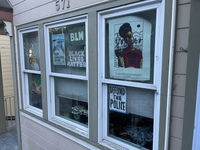 |
| Angelika/Mike Schilli |
|
Michael When it comes to political ideologies, Americans use terms that often mean the exact opposite of what their literal translation into German would imply, and that's why today I'm going to shed some light on this. First, the two-party system: you are either a "Democrat" or a "Republican." There is no "Green," "Liberal," "Leftist," or AfD member; 99% of all ideologies find their home in one of these two groups.
The translation into "Democrats" and "Republicans" is problematic in itself because both parties are democratic, and comparing "Republicans" with the former German right-wing party "Die Republikaner," which became popular in Germany in the 1980s, is not accurate. But let's leave it at that for now. Additionally, there are, of course, nuances within these two unified parties. For example, the current President, Biden, is more center-right among the Democrats, while socialist Sanders is far left. This leads to Biden being constantly criticized by young radicals within his own party for not being radical enough. Among Republicans, John McCain was once one of the moderates, and former President Trump was far right. Since Obama (a Democratic president) and especially since Trump (a Republican president), it has become difficult to find moderate Republicans, as the party has become highly radicalized. This mutual radicalization of both parties has resulted in virtually no cooperation between Democrats and Republicans nowadays. When one side proposes something, the other side reflexively torpedoes it.
An American "Democrat" is politically roughly aligned with a member of Germany's SPD (Social Democratic Party): They support labor unions, want to heavily tax the rich, assist low-income earners with state funds, enforce a firearm ban, and generally believe that the state should take matters into its own hands and steer it through detailed legislation. "Democrats" are not tired of claiming that all "Republicans" are backward idiots and hillbillies (almost all states in the middle of the USA, i.e., away from the coastal regions, are in Republican hands) and want the Electoral College (the complicated American electoral system, in which states appoint electors, giving smaller states more influence than purely by voter numbers) to be abolished. This would guarantee Democratic presidents for decades.
A "Republican," on the other hand, is positioned somewhat to the right of Germany's CDU (Christian Democratic Union), economically close to the FDP (Free Democratic Party), meaning they are employer-friendly. They prefer to levy as few taxes as possible, as the state should operate a lean apparatus that only intervenes in the free market in exceptional cases. Firearms remain permitted, as intended by the Constitution. Republicans point fingers at mega-cities in the USA, such as New York City, Chicago, or Los Angeles, all of which are in Democratic hands and struggle with high crime rates, unemployment, and general societal decay. Since Democratic voters outnumber Republicans at the federal level, due to the the densely populated coastal states are almost all being governed by Democrats, Republicans prefer the complicated electoral system to remain.
Now, let's talk about "liberal." In Germany, when someone says "liberal," they automatically mean the FDP (Free Democratic Party), because that's the liberal party, in the sense of "individual freedom" and "let the economy do its thing." In America, it means pretty much the opposite; a "liberal" is a person who doesn't interfere when other people do questionable things. For example, if someone reports on an online portal that their house was broken into and their laptop was stolen, there's always a "liberal" who feels sympathy for the poor burglar who apparently can't afford their own laptop. I know "liberals" who are so extreme that they specialize in finding excuses and never tire of explaining why it's okay for lawbreakers to break the law. They get very creative with it and raise their children to be unruly individuals without setting any boundaries. This certainly doesn't apply to all, but the tendency is there.
A "Progressive" is essentially a special case of a "Liberal," as the "Progressive" wants to radically change things, operating under the mantra that the state and police have done everything wrong so far and that it's time for a new approach. This generally means that the state should no longer engage in policing or punishing criminals, as such actions only lead to discord, anger, and unpleasant situations. The Progressive does not see that the absence of state pressure on wrongdoers could potentially lead to more crime. The idea that distributing money indiscriminately diminishes people's motivation to take care of themselves is unknown to them. They are indifferent to the fact that their extreme political programs alienate ordinary voters, who ultimately foot the bill with their taxes. According to the "Progressives," the pronounced social differences in America are the root of all evil.
Ironically, "progressives" in San Francisco have often become wealthy citizens due to the real estate bubble, having risen from being hippies. This brings me to the term "Champagne Socialist." This is someone who (seemingly) advocates for the common man and the public school system, but sends their own children to private schools because they want them to get a good education. Our governor, Gavin Newsom, is one such person, and in the hippie neighborhood of Bernal Heights, practically all the residents are like that. Well, now you know, in case you come across this term again!
Greetings from San Francisco:
Angelika and Michael












